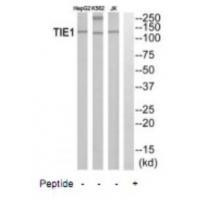
| WB | 咨询技术 | Human,Mouse,Rat |
| IF | 咨询技术 | Human,Mouse,Rat |
| IHC | 咨询技术 | Human,Mouse,Rat |
| ICC | 技术咨询 | Human,Mouse,Rat |
| FCM | 咨询技术 | Human,Mouse,Rat |
| Elisa | 咨询技术 | Human,Mouse,Rat |
| Aliases | TIE; Tyrosine-protein kinase receptor Tie-1 precursor; |
| Entrez GeneID | 7075; |
| WB Predicted band size | 130kDa |
| Host/Isotype | Rabbit IgG |
| Antibody Type | Primary antibody |
| Storage | Store at 4°C short term. Aliquot and store at -20°C long term. Avoid freeze/thaw cycles. |
| Species Reactivity | Human |
| Immunogen | Synthesized peptide derived from internal of human TIE1. |
| Formulation | Purified antibody in PBS with 0.05% sodium azide. |
+ +
以下是3-4篇关于 **TIE1抗体** 的参考文献及其简要摘要:
---
1. **文献名称**:*"TIE1 is a novel prognostic marker and promotes invasiveness in melanoma via regulating MMPs"*
**作者**:Chen et al. (2020)
**摘要**:该研究通过TIE1特异性抗体发现其在黑色素瘤中高表达,并与患者预后不良相关。实验表明,TIE1通过调控基质金属蛋白酶(MMPs)促进肿瘤细胞侵袭,提示其作为潜在治疗靶点。
---
2. **文献名称**:*"Development of a monoclonal antibody against human TIE1 for immunohistochemical analysis"*
**作者**:Sato et al. (2016)
**摘要**:研究团队开发了一种针对人TIE1胞外域的单克隆抗体,验证了其在免疫组化中的特异性,并用于检测正常组织和肿瘤血管内皮中TIE1的差异性表达,为血管生成研究提供工具。
---
3. **文献名称**:*"TIE1 regulates endothelial cell function by modulating Angiopoietin-TIE2 signaling"*
**作者**:Marron et al. (2017)
**摘要**:利用TIE1中和抗体阻断实验,揭示TIE1通过与TIE2受体相互作用调节血管内皮细胞对Angiopoietin-1/2的响应,影响血管稳定性和通透性,为心血管疾病机制提供新见解。
---
4. **文献名称**:*"Antibody-mediated inhibition of TIE1 improves outcomes in experimental pulmonary hypertension"*
**作者**:Kim et al. (2019)
**摘要**:研究发现TIE1在肺动脉高压模型中异常激活,使用TIE1阻断抗体可减轻肺血管重塑和右心室肥厚,提示其作为治疗肺动脉高压的潜在策略。
---
以上文献涵盖了TIE1抗体在肿瘤研究、工具开发、信号机制探索及疾病治疗中的应用。
**Background of TIE1 Antibody**
The TIE1 (tyrosine kinase with immunoglobulin-like and EGF-like domains 1) receptor is an endothelial cell-specific receptor tyrosine kinase critical for vascular development and maintenance. Initially identified as an orphan receptor, TIE1 regulates angiogenesis, vascular stability, and endothelial cell survival, often interacting with the closely related TIE2 receptor. While its ligands remain less defined compared to TIE2 (which binds angiopoietins), TIE1 is thought to modulate TIE2 signaling and serve as a coreceptor in the ANGPT/TIE2 pathway. Dysregulation of TIE1 is implicated in pathological conditions, including cancer, atherosclerosis, and pulmonary hypertension, where abnormal vascular remodeling occurs.
TIE1 antibodies are essential tools for studying its expression, activation, and functional roles. These antibodies enable detection of TIE1 in techniques like Western blotting, immunohistochemistry, and flow cytometry, aiding research into endothelial cell behavior and vascular pathologies. Some antibodies are designed to block TIE1 activity, helping dissect its signaling mechanisms or assess therapeutic potential in preclinical models. Recent studies also explore TIE1's role in inflammatory responses and tumor angiogenesis, highlighting its dual context-dependent functions in promoting or suppressing disease progression. As research advances, TIE1 antibodies remain pivotal in unraveling vascular biology and developing targeted therapies.
×